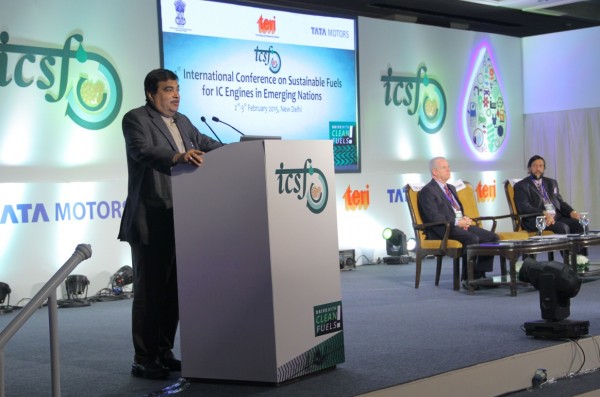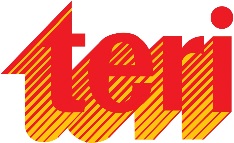- Finding the perfect sustainable fuel to meet the global demand is a challenge: Experts at TERI conference
The Energy and Resources Institute (TERI) and Tata Motors today organized the International Conference on ‘Sustainable Fuel for IC Engines in Emerging Nations’. The two-day conference is first in a series of biennial conferences, which will focus on identifying alternative sustainable fuels that can help in controlling Greenhouse Gas (GHG) emissions.
Inaugurating the event, Dr R K Pachauri, Director General, TERI, said: “The growth in road transport in India and the massive proliferation of internal combustion engines in the emerging economies of the world requires all round analysis of choices for fuels to be used in the transport sector to ensure environmental protection and sustainability. Air pollution in the cities and highways of India requires a detailed assessment of the current situation and choices that India, as well as other emerging economies, has in setting directions for the future. This conference will be a major step in defining the future of sustainable fuels and providing a basis for policies and strategies to support environmental quality, security of supply and sustainability in the transport sector.”
Speaking at the event, Mr Nitin Gadkari, Hon’ble Union Cabinet Minister of Road Transport, Highways and Shipping, said: “Pollution is a big problem for all Indian cities. Second, we are importing petroleum products, coal and gas and we are spending a lot in doing so. Our government is working closely on assessing the reach of biofuels and other sustainable fuels. The first bus using ethanol has been plying in Nagpur for the past three months, and it has been a success till now. We are also in the process of experimenting with biodiesel and bio-CNG. It is that time for the economy and country, when we should give the highest priority to alternative and sustainable fuels. In all this, we also want to promote our ‘Make in India’ campaign and utilize the home-grown technical knowhow to meet our demands.”
It is generally acknowledged that it is necessary to limit GHG equivalent levels to below 450 ppm to avoid global temperatures to rise above 20C. Higher levels will give rise to higher temperatures and potentially catastrophic consequences. To reverse this trend, it is anticipated that overall GHG levels will need to reduce by 80 per cent by 2050.
Mr Shirish Garud, Associate Director, Energy Environment Technology Development, TERI, said: “Environmentally benign and locally available fuels are need of the hour if India has to maintain the pace of economic growth on sustainable development track. TERI has done path-breaking research on biofuels using pyrolysis and catalytic technology and renewable energy applications. The technologies are on the verge of commercialization. Considering India’s demand for fuels, we need to focus on multiple alternatives. Time has come to bring together the research fraternity, industry and policymakers to map out the current status.”
Dr. Gopichand Katragadda, Group Chief Technology Officer, Tata Sons, said: “India is at an inflection point for all round development. Significant growth is anticipated in the power, automotive, aerospace and locomotive sectors. These areas are all energy intensive and it is anticipated India will add close to 250 GW during the next 10 years in power generation, and the demand for petrol and diesel is slated to double. The supply of traditional fuels will not keep up with the demand. It is imperative to look at environmentally conscious ways of meeting the demands of development and provide a context for this timely conference on sustainable fuels.”
Conventional transportation technologies usually involve the use of fossil fuels for vehicle propulsion. Rising fuel prices are generating awareness and interest in alternative transportation technology. Many automobile companies are now working towards developing more sustainable vehicles to combat fuel costs and minimize the harmful environmental effects of petroleum as a fuel source.
Dr Tim Leverton, President and Head, Advanced and Product Engineering, Tata Motors, said: “By 2040, India’s CO2 emissions are expected to be 60 per cent of that of the USA. We are delighted to be in the vanguard of the Sustainable Fuel movement that the country needs to embark upon. It is imperative for consumers across the globe to have a perspective on the climate-related risk. We have come together to focus on a practical roadmap for which policies and actions are required for a sustainable future. Tata Motors and TERI have taken a step in this direction to facilitate all stakeholders of the opportunity that currently exists. The grand challenge is to find fuel (or fuels) that can be produced sustainably, at economically viable costs, at the volumes required to replace hydrocarbon fuels that can be used in conventional IC Engines with minimal modification which could also meet or exceed emissions requirements.”
Researchers are working to explore new fuels and vehicle technologies. The general conclusion is that whilst improvements will continue, they will reach a lower limit of around above 80g CO2/km. A number of new technologies are available:
- Hybrids, electric vehicles, and hydrogen fuel cell vehicles are being intensely researched, along with efficient technologies for gasoline and diesel vehicles
- Renewable fuels such as ethanol and biodiesel can help offset the use of petroleum
- Other fossil fuels such as coal, shale oil, tar sands, and natural gas are other alternatives
A Few Highlights
- Despite a steady escalation of climate change mitigation policies, annual GHG emissions have grown at double the rate from 2000–2010, as compared to the period between 1970 and 2000
- Between 2000 and 2010, the transport sector contributed a significant amount of 14 per cent to the total anthropogenic GHG emissions. In addition, the transport sector also accounted for 27 per cent of energy use, while the baseline CO2 emissions are projected to double by 2050 (IPCC Report, 2014)
- The NDA government has plans to come out with policies to introduce clean fuels such as biodiesel, bioethanol and electricity for public transport vehicles and for school buses in big cities to combat air pollution
- Electric cars can save millions of lives from the harmful effects of air pollution, but only if they’re powered by renewable energy
- In the present scenario, if economically viable fuels could be identified that result in very less or zero net GHG, require minimal engine modifications, provide efficient storage and transport solutions, then this would be a valuable alternative mechanism for reducing GHG emissions
- The conference saw a range of luminaries such as Prof Surya Prakash, Professor and George A and Judith A Olah Nobel Laureate Chair in Hydrocarbon Chemistry, University of Southern California; Prof Arthur Ragauskas, Professor, School of Chemistry & Biochemistry, Georgia Institute of Technology, GA; Prof Pål Börjesson, Professor, Lund University, Sweden, among others, who discussed different aspects of alternative fuels and challenges in the current scenario
About TERI
The Energy and Resources Institute (TERI) is an independent, not-for-profit research organization deeply committed to every aspect of energy, environment, and sustainable development. From providing environment-friendly solutions to rural energy problems, to helping shape the development of the Indian oil and gas sector; from tackling global climate change issues across many continents to enhancing forest conservation efforts among local communities; from advancing solutions to growing urban transportation and air pollution problems to promoting energy efficiency in Indian industries, the emphasis has always been on finding innovative solutions to make the world a better place in which to live. Headed by Dr. R. K. Pachauri, also the chairperson of the Nobel Peace Prize-winning climate change body, IPCC, TERI has emerged as an institution of excellence for its ground-breaking research.


